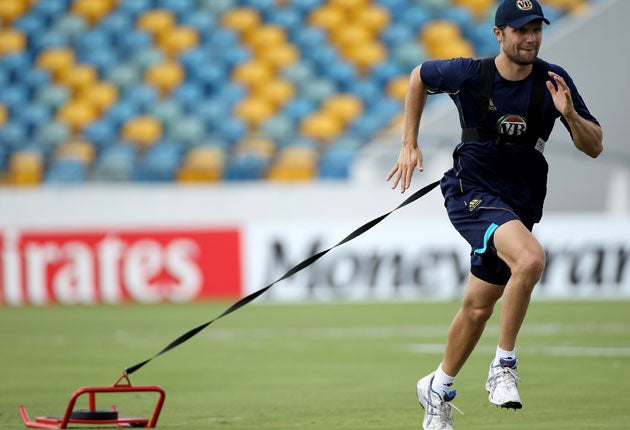The skier who became a Twenty20 mogul
Fast bowler Nannes 'just kind of fell into the game' and doesn't know the secret of his success – but it's working

What is the key to sporting excellence? Luck and natural talent? Or just sheer hard work? It is a question with which scientists, psychoanalysts and sportswriters continue to grapple. Examining the debate in a new book (Bounce: How Champions Are Made), journalist Matthew Syed argues for the latter, essentially supporting the observation once made by the golfer Arnold Palmer (borrowed later by Gary Player) that "the more I practise, the luckier I get".
With those words in mind, you wonder what Syed would make of Dirk Nannes, the Australian cricketer. As a youngster growing up, he had no ambition to play and has never been inclined to work on his skills. Yet his excellence is beyond doubt. As the English Twenty20 season begins this week, he joins Nottinghamshire as the world's most successful bowler in the shortest form of the game, needing only two more wickets to be the first to reach 100.
He has won two Twenty20 titles with Victoria and one with Middlesex in 2008, played in an Indian Premier League semi-final with Delhi Daredevils, helped the Holland team (he has Dutch parents) stun England in the 2009 World Twenty20 and, most recently, reached the 2010 final with Australia, losing to England but finishing as the tournament's leading wicket-taker with 14.
Yet he can offer no explanation as to how it has come about, although any study of the Nannes back-story would need to take account of the somewhat unconventional route his career has followed and the way it has shaped his outlook.
He did not have a professional contract until he was almost 30. Previously he was a competitive skier, contesting World Cup events around the globe and narrowly missing selection for the 1998 Winter Olympics. He lives in Mount Buller, 1,800m above Melbourne in the Australian Alps, and runs a ski travel company with his wife, Erin.
"It's a bit bemusing sometimes," he said, the inquiry prompting a shrug of the shoulders and a puzzled look. "I never really wanted to be a cricketer. I was rubbish at school, Third XI standard. Certainly, nobody ever suggested it could be a career.
"What I really wanted to be was a sax player. Then I started to be pretty good at skiing and wanted to be a skier. I spent my early twenties going around the world competing at mogul skiing and I just kind of fell into cricket when I stopped.
"Maybe it was when I grew up and my body started to mature and I began to bowl fast. When I was about 27 someone said, 'How about you don't go skiing this year because you might play for Victoria'. It was only then that I twigged I might play at a decent level."
With one convention demolished, the focused upbringing, the conversation turns to practice. "I like to keep bowling but that doesn't mean 20 overs in a day," he said [he retired from four-day cricket this year, anxious not to overtax his body]. I like to bowl a couple of times a week. I do need that to keep the radar tuned. But I don't tend to bowl eight overs in the nets and I never bowl the day before a game unless I get told I have to. I think in the World Cup I didn't bowl a ball in the nets during the whole tournament."
Nor does he think much about opponents or tactics. "The more I play, the less I care about what the opposition might have done. I know that if I bowl a great ball it will get any batsman out. I don't feel a lot of pressure in cricket, and that maybe helps. Because I have a lot of other things going on, I don't think about it too much. When I finish a game I just forget about it.
"That is a good thing and a bad thing. Because I don't think about it, I don't know a lot about cricket. But I'm not sitting around stewing on a result. When I walk into my house, it doesn't matter whether we won or lost, I'm still the same."
Otherwise, he says, there is not much to analyse. "My tactics are simple. I bowl straight and I try to bowl as fast as I can. I throw in the odd slower ball but I don't have a lot of tricks that other bowlers have. I'd like to learn a few different things but I suppose what I do now works and if it ain't broke, don't fix it."
Six of the best
Brendon McCullum (Sussex)
Kiwi big-hitter's 158no for Kolkata Knight Riders in 2008 remains the world-record T20 score. Hit 116no against Australia earlier this year.
Brad Hodge (Leicestershire)
Still going strong at 35, the Australian is T20's leading run-scorer with 2,646 runs, including a century and 19 fifties.
Albie Morkel (Durham)
Perhaps the best all-rounder in T20, the South African has hit 88 sixes left-handed and taken 93 wickets bowling right-arm medium-fast.
Ross Taylor (Durham)
The aggressive New Zealand top-order batsman has struck more sixes (124) than any other batsman in T20.
David Hussey (Nottinghamshire)
The Aussie batsman is second only to Hodge in runs scored (2,628) and to Taylor in sixes hit (122). Also has 35 wickets bowling off-spin.
Loots Bosman (Derbyshire)
A shrewd signing by the Midlands county, Bosman stunned England by hitting 94 off 44 balls for South Africa last November.
Jon Culley
Join our commenting forum
Join thought-provoking conversations, follow other Independent readers and see their replies
Comments
Bookmark popover
Removed from bookmarks